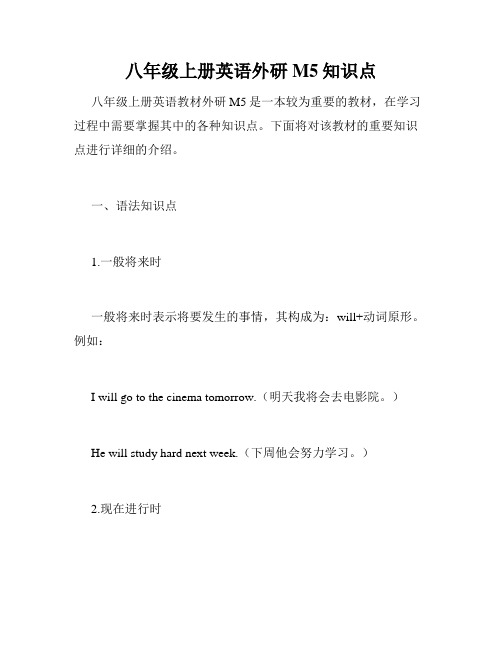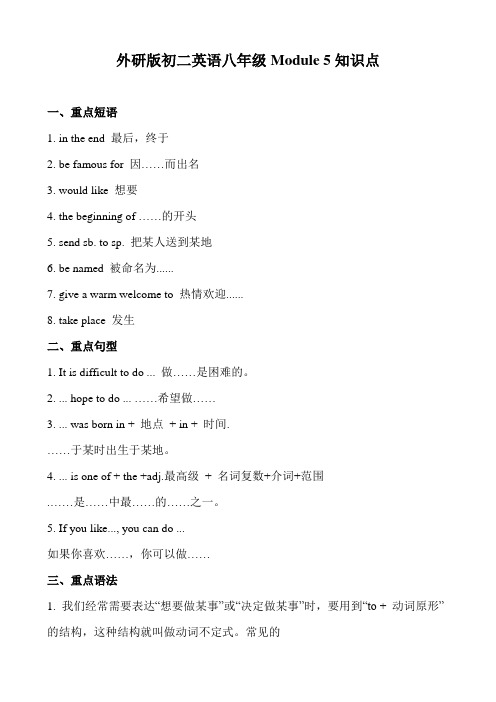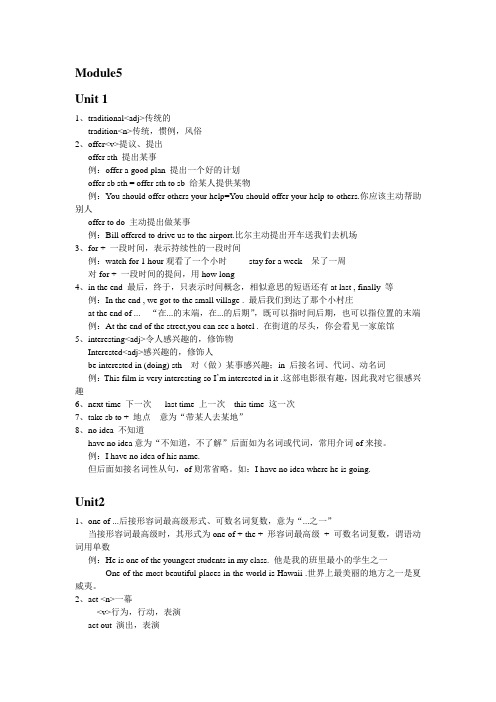八年级英语上册学习重点(外语教研版全解模块5)
八年级上册外研版m5的知识点

八年级上册外研版m5的知识点八年级上册外研版M5是中学英语课程中的一部分,主要涉及口语交际的基础知识和语法。
以下是本单元的主要知识点:一、情态动词情态动词可以用于描述说话人的态度、说话人的要求、推断和建议等情况。
其中最常用的情态动词包括can、could、may、might、must、shall、should、will、would,其用法如下:1、can/ could 表示能力例如:I can swim.(我会游泳。
)2、may/ might 表示推断例如:It may rain tonight.(今晚可能下雨。
)3、must 表示肯定例如:He must be very tired.(他一定很累了。
)4、shall/ should表示建议或要求例如:You should go to bed early tonight.(你今晚应该早点睡。
)5、will/ would 表示意愿和请求例如:I will help you with your homework.(我会帮你做作业。
)二、比较级和最高级比较级是用来表示两个人或物之间的比较,最高级则是用来表示三个或以上人或物之间的比较。
其用法如下:1、比较级的构成:形容词+er或more+形容词、副词+er或more+副词例如:She is taller than her sister.(她比姐姐高。
)He runs faster than me.(他跑得比我快。
)2、最高级的构成:形容词+est或most+形容词、副词+est或most+副词例如:This is the most interesting book I've ever read.(这是我读过的最有趣的书。
)三、虚拟语气虚拟语气用于表达可能发生但实际未发生的情况,常用于条件状语从句和愿望句子中。
其用法如下:1、虚拟语气在条件状语从句中用于表示与事实相反的假设例如:If I were you, I would ask my teacher for help.(如果我是你,我会向老师寻求帮助。
外研版八年级上册Module 5知识点整理

外研版八年级上册Module 5知识点整理一.重点短语1.in the end最后,终于2.be famous for因……而出名”3.would like想要4.the beginning of……的开头5.send sb. to sp.把某人送到某地6.be named被命名为……7.give a warm welcome to热情欢迎……8.take place发生9. no idea 不知道二.用法集萃1.want to do sth.想要做某事2.offer to do sth.主动提出做某事3.plan to do sth.计划/打算做某事4.hope to do sth.希望做某事5.Let’s do sth.让我们做某事吧。
6.Why don't we do sth?我们为什么不做某事呢?7.make sb./sth.+adj.使某人/某物处于……状态8.It is +adj. +to do sth.做某事是……的.三.重点句型1.Lingling offered to take me there.玲玲提议带我去那儿.2.He’s especially famous for his play Teahouse.他尤其以他的话剧«茶馆»而著名。
3.Teahouse is one of Lao She’s most famous plays.«茶馆»是老舍最著名的话剧之一。
o She Teahouse gives a warm welcome to everyone from all over the world.老舍茶馆热情欢迎来自世界各地的人们.四.语法归纳:(一)动词不定式作宾语(二)双宾语教材中含有动词不定式的句子:1.You know, I wanted to see the Beijing Opera.你知道,我想看京剧。
2.Lingling offered to take me there.玲玲提议带我去那儿。
(完整)外研版八年级英语上册Module5知识点总结,推荐文档

外研版八年级上册Module 5 知识点归纳一.短语强记drink tea 喝茶,in the end最后,main thing主要的事情,next time下次,no idea 不知道,be famous for因……而闻名,would like想要,one of… ……之一,common people普通人,the end of the nineteenth century 19世纪末,send…to 把……送到……,return to回到……,be named被命名为,the People’s Art ist人民艺术家,magic shows魔术表演,give a warm welcome to 热烈欢迎……,take place 发生,think about考虑,at the end of 在……末尾,have a great time过得愉快,at the same time同时二.知识点解析1. actress n. 女演员actor n.男演员2.want to do sth是主语某人自己想要做某事;want sb to do sth是主语某人想要让另外一人做某事want to______the Beijing Opera想去看京剧3.offer① offer sth. 主动提供某物,offer_____ ______提供一些建议② offer sb. sth.=offer sth. to sb. 给某人提供某物,offer a good job___him给他提供一份好工作③ offer to do sth. 主动提出做某事,offer ___ ____ me主动帮助我4.hope to do sth.希望做某事5.agree to do sth.同意做某事6.take…to…带某人或某物去某地,后接地点副词,to可以省略。
take me there7.in the end 最后,终于,相当于finally或at lastat the end of …在…的末尾,在…的尽头, at the _____ of the road8.No idea=I have no idea./ I don’t know.9.be famous for 因……闻名,Lao She is famous ______his play teahouse.be famous as 作为……而闻名, Lao She is famous ______a great writer.10.show①“展示;显示;给……看” show sb. sth.或show sth. to sb.给某人看或者展示某物,show me a book= show a book____me,注意:“show it(them) to sb.”结构。
八年级上册英语外研M5知识点

八年级上册英语外研M5知识点八年级上册英语教材外研M5是一本较为重要的教材,在学习过程中需要掌握其中的各种知识点。
下面将对该教材的重要知识点进行详细的介绍。
一、语法知识点1.一般将来时一般将来时表示将要发生的事情,其构成为:will+动词原形。
例如:I will go to the cinema tomorrow.(明天我将会去电影院。
)He will study hard next week.(下周他会努力学习。
)2.现在进行时现在进行时表示现在正在进行的事情,其构成为:am/is/are+现在分词。
例如:I am studying English now.(我正在学习英语。
)They are playing basketball at the playground.(他们正在操场上打篮球。
)3.形容词比较级形容词比较级表示两个事物之间的比较,其构成为:原级+er。
例如:Tall --- Taller(高的 --- 更高的)Smart --- Smarter(聪明的 --- 更聪明的)4.情态动词情态动词是用来表达某个动作的可能性、愿望等,包括can、could、may、might、shall、should、will、would、must等。
例如:I can swim very well.(我能游泳。
)She should finish her homework in time.(她应该及时完成作业。
)二、词汇知识点1.时间表达时间表达是重要的词汇知识点,在日常中会经常用到,例如:Monday(星期一)Tuesday(星期二)Wednesday(星期三)Thursday(星期四)Friday(星期五)Saturday(星期六)Sunday(星期日)2.健康健康词汇是重要的日常生活用语,需要掌握,例如:Healthy(健康的)Ill(生病的)Cold(感冒)Headache(头痛)Fever(发烧)三、阅读知识点阅读是英语学习中重要的环节之一。
外研版初二英语八年级Module 5知识点

外研版初二英语八年级Module 5知识点一、重点短语1. in the end 最后,终于2. be famous for 因……而出名3. would like 想要4. the beginning of ……的开头5. send sb. to sp. 把某人送到某地6. be named 被命名为......7. give a warm welcome to 热情欢迎......8. take place 发生二、重点句型1. It is difficult to do ... 做……是困难的。
2. ... hope to do ... ……希望做……3. ... was born in + 地点+ in + 时间.……于某时出生于某地。
4. ... is one of + the +adj.最高级+ 名词复数+介词+范围.……是……中最……的……之一。
5. If you like..., you can do ...如果你喜欢……,你可以做……三、重点语法1. 我们经常需要表达“想要做某事”或“决定做某事”时,要用到“to + 动词原形”的结构,这种结构就叫做动词不定式。
常见的后接动词不定式作宾语的动词有:plan, decide, want, agree, try, hope, offer, like, need 等2. 英语中,有些动词可以接两个宾语,即指人的间接宾语和指物的直接宾语,这两个宾语称为“双宾语”。
此类动词常见的有:buy, pass, give, offer, show, bring, send 等。
其句型结构为:主语+动词+间接宾语+直接宾语= 主语+ 动词+ 直接宾语+ 介词(for / to) + 间接宾语注意:当表示物的宾语为代词时,只能使用主语+ 动词+ 直接宾语+ 介词+ 间接宾语”的表达形式。
例如:Can you send it to me as soon as possible?你能尽快把它邮寄给我吗?增强背诵记忆的方法• 勤动手指锻炼手指功能可健脑益智,促进思维。
八年级上半年外研版m5知识点

八年级上半年外研版m5知识点八年级上半年英语学习中,M5知识点是重要的一部分,强化这些知识点能让学生达到更好的学习效果。
一、动词时态1.现在时态现在时态表示目前正在发生的事情,以及经常性的动作或状态。
例如:My sister is watching TV now. (现在进行时)I usually get up at 6 o'clock. (现在简单时)2.过去时态过去时态表示过去发生的动作或状态。
例如:Yesterday, I went to the cinema. (一般过去时)When I was a child, I studied English. (过去进行时)3.将来时态将来时态表示将要发生的动作或状态。
例如:I will meet my friend tomorrow. (一般将来时)They are going to visit Beijing next month. (现在进行时)二、虚拟语气虚拟语气表示假设、愿望、建议等语气。
1.表示假设如果对现在或将来的情况进行假设,使用虚拟语气。
例如:If I were you, I would go to the hospital. (与现在事实相反的虚拟语气)If it rained tomorrow, we would stay at home. (将来虚拟语气)2.表示愿望如果表示愿望,也使用虚拟语气。
例如:I wish I could speak English fluently. (过去虚拟语气)If only I had enough money, I could travel around the world. (与现在事实相反的虚拟语气)3.表示建议如果表示建议,也可以使用虚拟语气。
例如:I suggest that you should take a rest. (虚拟语气)If I were you, I would study harder. (与现在事实相反的虚拟语气)三、情态动词情态动词表示说话者对某事的态度或看法,如可能性、义务、建议等。
外研社八年级英语上册Module5知识点

Module 5 Lao She Teahouse一、重点词组1、want to do 想做某事2、offer to do 主动提出做某事3、plan to do 计划做某事4、hope to do 希望做5、the traditional Beijing Opera 传统京剧6、easy/difficult/hard to understand 容易/难理解7、take sb. to sp. 带某人去某处8、in the end 最后,终于9、be famous for 因为…而闻名10、would like to do 想要做某事11、understand the main ideas 理解主旨12、one of the most famous plays 最有名的戏剧之一13、the end of the nineteenth century 十九世纪末14、the middle of the twentieth century二十世纪中期15、People ’s Artist 人民艺术家16、all over the world/around the world 全世界17、take place 发生18、at the same time 同时19、from…to 从...到二、重点句型1、I want to see Beijing Opera.want to do something. 想做某事2、So Lingling offered to take me there.offer to do something 主动提出做某事【拓展】offer 可以做名词,“提议、出价、提供”3、We only planned to watch for an hour.plan to do something 计划做某事4、I hope to under more next time.hope to do something希望做某事5、It was difficult to understand the words.It’s +adj+(for/of sb.)+ to do sth. 对某人来说做某事是怎么样的。
新版外研社八年级上 Module5 Lao She Teahouse 全模块最全语法总结

Module5Unit 11、traditional<adj>传统的tradition<n>传统,惯例,风俗2、offer<v>提议、提出offer sth 提出某事例:offer a good plan 提出一个好的计划offer sb sth = offer sth to sb 给某人提供某物例:You should offer others your help=You should offer your help to others.你应该主动帮助别人offer to do 主动提出做某事例:Bill offered to drive us to the airport.比尔主动提出开车送我们去机场3、for + 一段时间,表示持续性的一段时间例:watch for 1 hour观看了一个小时stay for a week 呆了一周对for + 一段时间的提问,用how long4、in the end 最后,终于,只表示时间概念,相似意思的短语还有at last , finally 等例:In the end , we got to the small village . 最后我们到达了那个小村庄at the end of ... “在...的末端,在...的后期”,既可以指时间后期,也可以指位置的末端例:At the end of the street,you can see a hotel . 在街道的尽头,你会看见一家旅馆5、interesting<adj>令人感兴趣的,修饰物Interested<adj>感兴趣的,修饰人be interested in (doing) sth 对(做)某事感兴趣;in 后接名词、代词、动名词例:This film is very interesting so I’m interested in it .这部电影很有趣,因此我对它很感兴趣6、next time 下一次last time 上一次this time 这一次7、take sb to + 地点意为“带某人去某地”8、no idea 不知道have no idea意为“不知道,不了解”后面如为名词或代词,常用介词of来接。
- 1、下载文档前请自行甄别文档内容的完整性,平台不提供额外的编辑、内容补充、找答案等附加服务。
- 2、"仅部分预览"的文档,不可在线预览部分如存在完整性等问题,可反馈申请退款(可完整预览的文档不适用该条件!)。
- 3、如文档侵犯您的权益,请联系客服反馈,我们会尽快为您处理(人工客服工作时间:9:00-18:30)。
八年级英语上册学习重点Module 5 Western musicUnit 1 You like western classical music,don’t you?你喜欢西方古典音乐,不是吗?内容详解1.W ho’s it by?这是谁创作的?by是介词,意思是“由。
”He know it’s a play by Shakespeare。
他知道这是莎士比亚的一部戏剧。
2.Well,I’m not sure。
噢,我不太清楚。
sure 常用作形容词,意为“肯定的”,常见用法有:Take it eafy.I’m sure of it.别急,我对它有把握I’m sure that I can pass the exam.我确信我能通过这次考试She’s sure to arrive on time.她一定会准时到达的提示:make sure也是一个常用词组,意为“确保;查明”,后接of短语或宾语从句。
They scored another goal and made sure of victory他们又进了一个球,这就赢定了。
Make sure that they know nothing about our plan。
绝对不能让他们知道我们的计划3.What’s it called?这首乐曲叫什么名字?be called …意为“被叫做….”,为被动语态结构。
被动语态表示主语是谓语动作的承受者,被动语态结构:助动词be+及物动词的过去分词”。
be有人称、数和时态的变化。
被动语态句型巧记口诀:被动语态强调宾(语),用be加上过去分(词),行为对象作主语,逻辑主语by来引。
4.so she doesn’t like pop music,does she?所以她不喜欢流行音乐,对吧?反意疑问句是一个肯定或否定的陈述句后加一个简短的问句,回答时用yes或no。
在回答类似上面这种“前否后肯”型的反意疑问句时,也必须遵循“yes+肯定的简短答语”和“no+否定的简短答语”的基本原则。
但翻译时要注意英汉两种语言的差异,yes译为“不”,而no意为“是的”/-You haven’t been to Tianjin ,have you?你没去过天津,是吗?-Yes,I have。
/No, I haven’t.不,我去过。
/是的,我没有。
例:-Kate didn’t go to school yesterday,did she?-__________,though she did not feel very well.A.Yes,she did.B.Yes,she didn’t.C.No,she didin’t.D.No,she did.5.Give me a break!别再烦我了。
Give sb. a break在口语中表达“别再烦某人了”的含义6.What on earth is that?那究竟是什么?on earth 意为“究竟,到底”,用于疑问词之后加强语气。
What on earth are they talking about?他们到底在谈论什么?on Earth意为“在地球上”,相当于in the world7.It’s lively and good to dance to.它活泼轻快并且造合随着跳舞dance to 随着。
摇摆We danced to the music.我们随着音乐跳舞。
※跟踪训练Module 5 unit 1一、完成单词1.My favorite music is western c___________music.2.He is a singer,but he can’t play any ______________(乐器)3.The old like t______________Beijing Opera.4.I like pop music because it sounds l____________.5.Look,there are many b___________flowers in the garden.6.What f___________it will be when we all go on holiday together!7.Mozart is one of the greatest____________(作曲家)in the world.二、完成反意疑问句1.Country music sounds beautiful,_________ __________?2.We have something to do this afternoon,________ _______?3.We won’t go swimming this weekend,__________ __________?4.Mike has worked in this factory for ten years,__________ ___________?5.Lucy’s parents weren’t at home yesterday,_________ ___________?内容详解(Module 5 Unit 2)1.The father,Johann Strauss the elder,wrote and played music for a classical dance. elder 与olderMy elder brother is one year older than I。
2.His waltzer made him famous all over Europe.make sb.+adj.意为“使某人。
”The noise from upstairs made the woman unhappy.make sb. do sth. 意为“使(让)某人做某事The manager made the workers work all night。
经理让工作们整夜工作。
3.even,much,a lot,a little,far等也经常用于比较级前表示程度,意思分别为“更加,。
得多,更加,有点等Lingling is much more careful than me.very,very much,too和too much均不可用来修饰比较级4.not only。
but also是一个表示并列关系的连词词组,用来连接两个并列关系的句子成分。
He’s not only my teacher,but also my good friend.当either…or…,neither…nor…,not only…but also…连接两个主语时,其谓语动词要与靠近的主语保持一致。
Neither she nor I am a worker。
她和我都不是工作。
5.But he died in 1791 when he was only 35.然而他于1791年就去世了,年仅35岁。
die v.死,死亡die作不及物动词时,表示“死亡”,没有被动语态。
它只能表示一时的动作,不能与表示一段时间的状语连用。
He died in an accident.他死于一起事故。
He died for his country.他为国捐躯了。
※跟踪训练(MODULE 5 UNITE 2)一、完成单词1.Vienna is the c_________city of Austria and the c_______of European classical music.2.What did Mozart write in a__________to operas?3.__________(或许)Tom can play the guitar.4.This is Ann,my_________(年长的)sister.5.His grandpa has been________(死) for ten years二、完成句子1.Some people say Mozart was ______ ________ ________ _________(欧洲最伟大的作曲家)2.The son’s words_______the mother________ ________(使。
很伤心)3.______ ________ _________(除了)these subjects,they will learn two more ones.4.People think he is ______ ________ _________ _________ __________(伟大的作曲家之一)of classical and traditional music.5.The conductor_______ ________(确保)that everyone plays together.内容详解(MODULE UNIT 3)1.may be 与maybe2.loud,loudly与aloud区别They laughed loud and long,他们大声笑个不停。
Suddenly the bell rang loudly。
突然,铃声大响Don’t read aloud in the library.不要在图书馆里朗读4.In 1968 Elvis got his own TV show and it was very popular.在1968年埃尔维斯拍了自己的电视节目并且很受欢迎。
own作为形容词,意为“自己的”,常与所有格连用。
固定结构为“物主代词+own+名词”或“名词+of+物主代词+own”This is my own house.这是我自己的房子。
Can you see the house of my own?own作动词时,意为“拥有”,相当于haveI own/have a bicycle.5.belong to 属于;归。
所有,其中belong为不及物动词,to为介词,后接宾语,不用于进行时态,也不用于被动语态。
The book belongs to me .※跟踪训练(Module 5 unit 3)一、完成单词1。
Evlis had lots of hit_________(唱片)and became very famous.2.One_________(世纪)ago, most people didn’t know how to use computers.3.Please turn down the radio.It’s too_________(noise)4.He is the_________(own) of the house.5.He is one of the greatest__________(艺术家)二、改写句子1.-Tom didn’t swim in the river yesterday afternoon,______ ___________? -Yes,he did (完成反义问句,并翻译画线句子.2.Both Lucy and Lily have been to Beijing(同义句)______ ________Lucy________ _________Lily__________been to Beijing.3.The TV set was bought over ten years ago.(同义句)The TV set was bought _________ _________ten years ago.4.Betty went to school at the age of six(同义句)Betty went to school ________ _________ _______six.5.He likes watching and playing football very much.(同义句)He is ________ _________ ___________football.※模块大归纳(Module 5 )一、基础词汇1.布鲁斯2.经典的,古典的3爵士乐 4.流行音乐5.摇滚乐6电子音乐7.美的,美丽的8有戏剧性的9有趣的事,逗人乐的活动10活泼的,轻快的11悲伤的12严肃的,严重有13慢的14传统的15肯定的16德国人17奥地利的,奥地利人的18作曲家19体育,音乐等的狂热爱好者,迷20说唱乐21吵闹的22中心23鼓24吉他25管风琴26小号27小提琴28年长的(尤指家庭成员之间)29死,死去30添加,添加物31剩余部分32也许33电话,电话机34事实上,实际上35乐器36种类37响亮的38福音音乐39弦40兼职的41送牛奶的人42录音43自己的44艺术家45人物,名人46世纪二、重点短语1.出生2听说3.。
